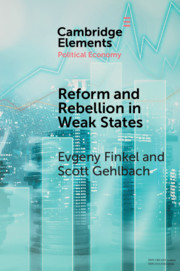Description
Reform and Rebellion in Weak States
Elements in Political Economy Series
Authors: Finkel Evgeny, Gehlbach Scott
Language: English
Subject for Reform and Rebellion in Weak States:
Approximative price 22.46 €
In Print (Delivery period: 14 days).
Add to cart
Publication date: 06-2020
Support: Print on demand
Support: Print on demand
Description
/li>Contents
/li>
Throughout history, reform has provoked rebellion - not just by the losers from reform, but also among its intended beneficiaries. Finkel and Gehlbach emphasize that, especially in weak states, reform often must be implemented by local actors with a stake in the status quo. In this setting, the promise of reform represents an implicit contract against which subsequent implementation is measured: when implementation falls short of this promise, citizens are aggrieved and more likely to rebel. Finkel and Gehlbach explore this argument in the context of Russia's emancipation of the serfs in 1861 - a fundamental reform of Russian state and society that paradoxically encouraged unrest among the peasants who were its prime beneficiaries. They further examine the empirical reach of their theory through narrative analyses of the Tanzimat reforms of the nineteenth-century Ottoman Empire, land reform in ancient Rome, the abolition of feudalism during the French Revolution, and land reform in contemporary Latin America.
1. Introduction; 2. Theory; 3. Russia; 4. Other cases; 5. Conclusion.
© 2024 LAVOISIER S.A.S.




